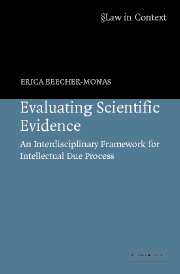Book contents
- Frontmatter
- Contents
- Acknowledgments
- Evaluating Scientific Evidence
- Introduction
- 1 Triers of science
- 2 What is intellectual due process?
- 3 A framework of analysis
- 4 Toxic torts and the causation conundrum
- 5 Criminal identification evidence
- 6 Future dangerousness testimony: The epistemology of prediction
- 7 Barefoot or Daubert? A cognitive perspective on vetting future dangerousness testimony
- 8 Future dangerousness and sexual offenders
- 9 Models of rationality: Evaluating social psychology
- 10 Evaluating battered woman syndrome
- Conclusion
- Index
- The Law in Context Series
4 - Toxic torts and the causation conundrum
Published online by Cambridge University Press: 04 December 2009
- Frontmatter
- Contents
- Acknowledgments
- Evaluating Scientific Evidence
- Introduction
- 1 Triers of science
- 2 What is intellectual due process?
- 3 A framework of analysis
- 4 Toxic torts and the causation conundrum
- 5 Criminal identification evidence
- 6 Future dangerousness testimony: The epistemology of prediction
- 7 Barefoot or Daubert? A cognitive perspective on vetting future dangerousness testimony
- 8 Future dangerousness and sexual offenders
- 9 Models of rationality: Evaluating social psychology
- 10 Evaluating battered woman syndrome
- Conclusion
- Index
- The Law in Context Series
Summary
It is in the arena of toxic tort cases that the “battle of the experts” has been the most vicious, protracted, and well publicized, at least in the United States. In the United Kingdom, Canada, Australia, and New Zealand, there are few toxic tort cases brought and far less controversy about the use of experts. In civil law countries such as the Netherlands, where experts are appointed by the court on mutual agreement of the parties and prepare a joint report, disagreements are rarely aired in court. But in the United States, toxic torts have been a battleground about what counts as science in the courtroom, and this issue propelled both Daubert and Joiner into the U.S. Supreme Court.
Because of long latency periods and symptoms common to many diseases, proving causation in toxic torts nearly always involves the use of scientific experts, and courts are often stymied by their gatekeeping responsibilities in this arena. The courts have particular difficulty with several major issues, including statistical analysis, the admissibility and evaluation of animal studies, the impact of cumulative studies, and the conflation of admissibility with sufficiency. The underlying reason that courts appear to founder in this area is that causation – an essential element for liability – is highly uncertain, scientifically speaking, and courts do not deal well with this uncertainty.
- Type
- Chapter
- Information
- Evaluating Scientific EvidenceAn Interdisciplinary Framework for Intellectual Due Process, pp. 57 - 93Publisher: Cambridge University PressPrint publication year: 2006



